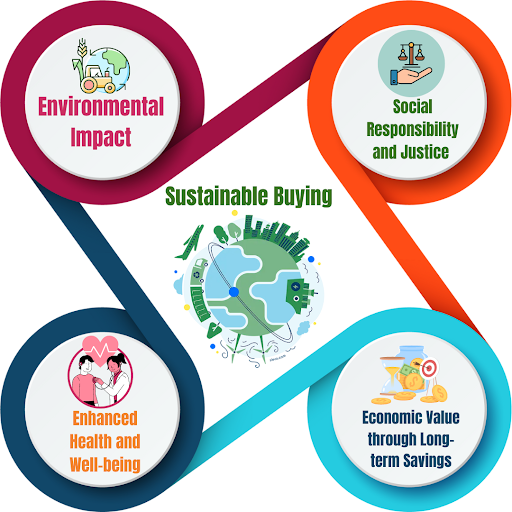
11 Dec Sustainable Buying: Making Ethical Choices for a Better Future Introduction
Sustainable buying is a conscientious response to the increasing recognition of the ecological and societal consequences of consumption habits. It serves as a potent mechanism for individuals to enact positive change. This practice involves purposefully selecting products and services that exhibit environmental friendliness, social responsibility, and ethical production. It signifies a departure from conventional consumer behaviour, extending consideration beyond immediate utility to encompass the broader repercussions of purchases on both the environment and society.
Sustainable buying entails making informed decisions that endorse companies committed to environmental sustainability, equitable labour practices, and principled sourcing. By opting for sustainable offerings, individuals actively contribute to the conservation of natural resources, waste reduction, and the enhancement of labour conditions within supply chains. This article explores the importance of sustainable buying, its benefits, and how individuals can incorporate it into their daily lives.
Making Informed Choices
To practise sustainable buying effectively, it’s essential to be an informed consumer. This requires researching the products and brands you’re interested in, understanding their production processes, and evaluating their social and environmental practices. Labels and certifications, such as organic, fair trade, and Energy Star, can be valuable indicators of a product’s sustainability credentials. Additionally, websites and apps dedicated to ethical consumerism provide valuable information and reviews to guide purchasing decisions.

The Benefits of Sustainable Buying
Every choice you make has the potential to shape a better future, both for you and the generations to come. Let’s explore the benefits of making sustainability a core part of our everyday buying decisions.
-
Positive Environmental Impact
Sustainable buying is all about making choices that truly matter. It’s about taking a stand against the invisible ecological footprint that our consumption leaves behind. Imagine this: every time you choose a product, you’re actually shaping the world around you. From renewable resources to minimal energy needs, these are the ingredients that go into your sustainable choices. Take the simple act of opting for locally sourced food – not only are you reducing the carbon footprint from transport, but you’re also giving a nod to a more sustainable future. And when you pick products made from recycled materials, you’re showing the world that you’re serious about cutting down on the demand for new resources, lightening the load on our precious ecosystems.
But it doesn’t stop there – sustainable buying is also about battling the big issues. Think single-use plastics and disposables that have become synonymous with pollution and habitat destruction. The solution? Embrace the power of durability and reusability. By saying yes to products that stand the test of time, you’re doing your bit to minimise waste and champion the circular economy – where resources are used smartly and waste is given a second life through recycling and repurposing.
And here’s the heart of it all: sustainable buying isn’t just about what you buy, it’s about the impact you make. It’s a journey that lightens the load on our Earth – from using fewer resources and creating less waste to slashing those carbon footprints. Choosing products with a smaller packaging footprint, made from recycled materials, or ethically sourced materials isn’t just a choice, it’s an action that speaks volumes. It’s about safeguarding biodiversity, taking on climate change, and ensuring that the world we pass on to future generations is healthier and more vibrant than ever. So, let’s make sustainable buying more than just a buzzword – let’s make it a way of life that truly transforms our world.
-
Social Responsibility and Justice
Sustainable buying goes beyond just reducing our environmental impact – it holds a profound message of social responsibility that resonates in today’s world. Think about it: when you choose products from companies that are all about fair labour practices and safe working conditions, you’re not just making a purchase; you’re making a statement that echoes across global workforces. It’s a struggle for human rights, a push for gender equality, and a boost for the livelihoods of those in fields ranging from agriculture to manufacturing. By supporting supply chains that put ethics first and empower workers, you’re essentially becoming part of a movement that envisions a world where every individual is treated with the respect and dignity they deserve.
But it doesn’t stop there – sustainable buying has a real impact on issues that affect us all. Picture this: you’re consciously choosing products made under conditions that uphold fairness and worker rights. You’re saying no to exploitative practices and yes to environments where safety isn’t a luxury but a given. It’s about standing up for the principles that matter most – for you, for them, for everyone.
Similarly, it’s not just about the products – it’s about the people and communities they touch. When you make the choice to buy sustainably, you’re supporting local businesses and artisans, and that’s not just a transaction – it’s an investment in economic growth. By embracing products from small-scale producers, you’re adding fuel to the fire of job creation and preserving the vibrant tapestry of cultural diversity that makes our world so rich.
-
Enhanced Health and Well-being
Sustainable products are often designed with a focus on health and well-being. Sustainable products often have minimal to no toxic ingredients, which can be beneficial for people’s health and well-being. By selecting organic foods, personal care items free from harmful chemicals, and household cleaners with minimal toxins, consumers safeguard their health and minimise exposure to potentially hazardous substances. Additionally, by reducing greenhouse gas emissions and air pollution, sustainable buying can help improve air quality, which can have positive impacts on respiratory health. This proactive stance aligns with preventive health measures and encourages a lifestyle that prioritises wellness while minimising the environmental impact of harmful chemicals.
-
Economic Value through Long-term Savings
Sustainable buying offers consumers multiple avenues for achieving savings. Among the various benefits contributing to consumer savings are the following:
Firstly, sustainable products are intentionally designed for extended durability, leading to a reduced frequency in replacements, thus yielding cost savings over the product’s lifespan. Additionally, these products prioritise energy and water efficiency, directly impacting lower utility bills for consumers.
Moreover, by minimising or eliminating toxic components, sustainable products negate the need for consumers to cover the expenses associated with hazardous waste disposal. Furthermore, the inherent durability of sustainable items obviates the necessity for frequent replacements, thus alleviating the financial burden of replacing damaged or worn-out products. Collectively, the practice of sustainable buying not only aligns with ethical considerations but also manifests as a prudent financial choice, reflecting its multifaceted advantages for mindful consumers.
Conclusion
In conclusion, sustainable buying transcends traditional consumer behaviour by advocating for environmentally friendly, socially responsible, and ethically produced choices. It empowers individuals to wield their purchasing power for positive change, encouraging well-informed decisions that align with personal values and contribute to global benefits. Beyond the individual level, sustainable buying fosters environmental preservation by reducing carbon footprints and waste, battling pollution, and safeguarding biodiversity. Furthermore, it champions social justice through support for fair labour practices and worker empowerment while nurturing local economies and cultural diversity. Ultimately, sustainable buying isn’t just about products; it’s a commitment to fairness, better lives, and a world where each choice echoes a message of responsibility and respect, leaving behind a legacy of positive transformation for generations to come

No Comments